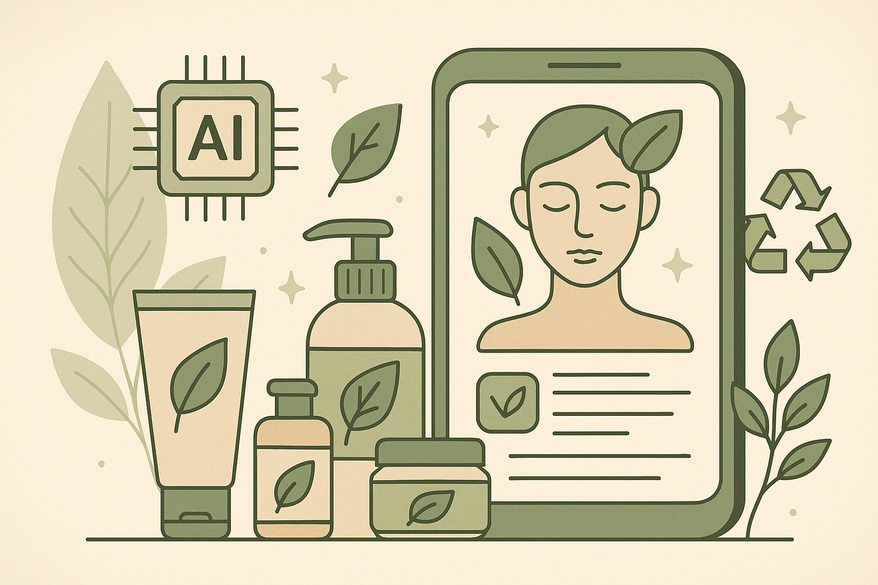Harnessing Organic Skincare AI: A Guide to Eco Beauty Recommendations and Sustainable Beauty Apps
Explore how organic skincare AI delivers personalized, eco-friendly beauty solutions through sustainable beauty apps, providing transparency and tailored routines.

Estimated reading time: 7 minutes
Key Takeaways
- Organic Skincare AI uses real-time data to tailor eco-conscious beauty routines.
- Eco Beauty Recommendations AI balances individual skin needs with sustainability criteria.
- Sustainable beauty apps offer smart analysis, ingredient transparency, and progress tracking.
- AI-driven skincare enhances personalization, accuracy, and environmental responsibility.
- Future trends include real-time ingredient traceability and hyper-personalized formulations.
Table of Contents
- Introduction
- Understanding Organic Skincare AI
- The Role of Eco Beauty Recommendations AI
- Exploring the Sustainable Beauty App
- How Organic Skincare AI Enhances the Experience
- Practical Tips for Consumers
- Future Trends and Innovations
- Conclusion
Consumer demand for personalized, eco-friendly beauty solutions is surging. Today’s beauty lovers expect tailor-made routines that honor both their skin and the planet. Enter organic skincare AI: the integration of artificial intelligence technologies into organic skincare to analyze, recommend, and personalize sustainable beauty routines. With eco beauty recommendations AI and a powerful sustainable beauty app, brands can deliver transparency, personalization, and environmental responsibility all in one. In this guide, you’ll learn how these tools work, why they matter, and how to put them to work for your healthiest, most sustainable glow.
For those looking to integrate a powerful AI-driven toolkit, the Maxx Report app offers personalized skincare and sustainability insights in one place.
Understanding Organic Skincare AI
Organic skincare AI leverages machine learning and advanced analytics to evaluate unique skin types, concerns, and goals using real-time data from moisture, pH, and texture. By combining multiple data streams, it tailors a routine that fits your skin’s current needs.
Data Inputs
- Smartphone camera sensors capture pore size, hydration levels, redness.
- User questionnaires record lifestyle, allergies, sensitivity.
- Wearable devices feed continuous information on humidity exposure and UV index.
AI Processes
- Data collection via app or connected device.
- Algorithmic analysis using convolutional neural networks and pattern recognition.
- Product recommendation engines match results to formulas rich in botanical oils and plant extracts.
For a complete overview of how AI systems recommend skincare, see AI Skincare Recommendation Guide.
Importance of Organic Ingredients
- Botanical oils (e.g., jojoba, rosehip) lock in moisture without clogging pores.
- Plant extracts (e.g., chamomile, green tea) soothe inflammation and provide antioxidants.
- Vitamins (A, C, E) support collagen production and skin barrier health.
Eco-Friendly Production & Ethical Sourcing
- Suppliers use minimal water and plant-based solvents.
- Packaging is often post-consumer recycled or compostable.
- Fair-trade farming ensures ethical labor and biodiversity preservation.
The Role of Eco Beauty Recommendations AI
Eco beauty recommendations AI relies on advanced algorithms to curate product suggestions that meet both individual skin needs and sustainability criteria. It balances efficacy with environmental responsibility.
Dataset Components
- User profiles: age, skin type, concerns, lifestyle.
- Product formulations: ingredient lists, active concentrations.
- Sourcing origins: farm location, certification status.
- Lifecycle impact assessments: carbon footprint, water usage, waste generation.
Case Example
A user with dry, sensitive skin:
- AI suggests a USDA-certified organic botanical moisturizer in a recycled glass jar.
- It flags synthetic alternatives high in microplastics as “avoid.”
- Recommends refillable options to reduce single-use waste.
Machine-Learning Verification
- Purity checks identify adulterated or mislabeled ingredients.
- Safety flags raise alerts for controversial substances (e.g., parabens, synthetic fragrances).
- Continuous model retraining incorporates new eco-certifications and sustainability data.
Exploring the Sustainable Beauty App
A sustainable beauty app merges organic skincare AI and eco beauty recommendations AI into a single user interface. You get real-time analysis, curated products, and progress tracking—all with sustainability filters.
Feature 1: Smart Skin Analysis
- Uses phone camera or sensors to assess hydration, tone, texture in seconds.
- Machine vision algorithms detect fine lines, dryness, and redness.
Feature 2: Personalized Recommendations
- Filters: USDA Organic, COSMOS, Ecocert, cruelty-free, low-waste, biodegradable.
- Suggests products that match both your skin profile and your eco-values.
For hands-on tools that deliver tailored regimens and transparent ingredient breakdowns, explore the personalized skincare analysis tool and a customized skincare routine app.
Feature 3: Routine Tracking & Progress Monitoring
- Automated reanalysis prompts every 4–6 weeks.
- Adaptive regimen updates when environment or your skin changes.
Feature 4: Ingredient Transparency Tools
- Barcode scanning reveals origin, efficacy, environmental impact of each ingredient.
- Interactive dashboards show carbon and water footprints per product.
How Organic Skincare AI Enhances the Experience
AI-driven systems transform organic skincare from guesswork into science-backed regimens. Here’s how:
Benefit 1: Personalization
- Objective data replaces generic routines.
- Custom formulas address hydration, discoloration, elasticity.
Benefit 2: Accuracy
- Ingredient selection based on your exact skin readings.
- Avoids irritants by cross-checking allergies and sensitivities.
Benefit 3: Sustainability
- Prioritizes ethically sourced, cruelty-free, low-impact products.
- Encourages refill and reuse to cut packaging waste.
Industry Impact
- Shift from reactive fixes to proactive prevention.
- Smarter supply-chain management slashes carbon footprints.
- Brands use predictive analytics to optimize harvest yields and reduce chemical run-off.
Practical Tips for Consumers
To maximize your sustainable beauty journey, follow these steps:
- Select apps offering robust ingredient-tracking and certification filters: look for USDA Organic, COSMOS, Ecocert badges, and cruelty-free verifications.
- Reanalyze skin quarterly with AI tools to adapt your regimen.
- Scrutinize ingredient lists: confirm transparent sourcing (farm, processing) and seek third-party testing reports.
- Use AI insights to choose eco-friendly packaging: recyclable glass or refillable pouches with biodegradable labels and ink.
Future Trends and Innovations
Trend 1: Real-Time Ingredient Traceability
- AI-powered blockchain tracks every step from seed to shelf.
- Consumers scan a QR code to see full supply-chain logs.
Trend 2: Hyper-Personalized On-The-Spot Formulations
- AI adjusts active ingredient levels based on live skin and climate data.
- In-app or in-store dispensers create customized serums instantly.
Trend 3: Dynamic “Clean” Definitions
- Databases update in real time as regulations and research evolve.
- Products are re-scored automatically when new studies emerge.
Trend 4: All-In-One Platforms
- Integration with health wearables (e.g., sleep, stress trackers).
- Community feedback loops and eco-impact calculators inform product evolution.
Conclusion
Organic skincare AI, eco beauty recommendations AI, and sustainable beauty apps are reshaping how we care for our skin and planet. By harnessing these technologies, you gain transparent insights, customized routines, and environmental peace of mind. As AI continues to advance, your role as a conscious consumer will drive even higher standards in sustainability and innovation. Download a sustainable beauty app today, try an AI-powered skin analysis, and share your feedback to help shape the future of eco-friendly beauty.
FAQ
- What is organic skincare AI?
It’s the use of machine learning and analytics to personalize natural skincare routines based on real-time skin data. - How do eco beauty recommendations AI work?
They analyze product formulations, sourcing data, and user profiles to suggest items that meet both skin needs and sustainability standards. - Are sustainable beauty apps accurate?
Accuracy depends on the underlying AI models and quality of input data; look for apps with robust verification and certification filters. - How often should I use AI skin analysis?
Experts recommend reanalysis every 4–6 weeks to account for changes in your skin and environment. - What future innovations can we expect?
Real-time traceability, on-the-spot formulations, dynamic clean definitions, and deeper wearable integrations are on the horizon.





